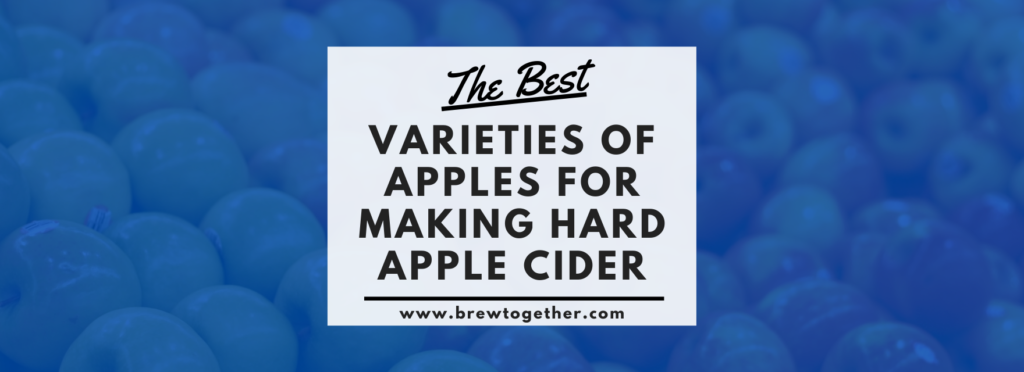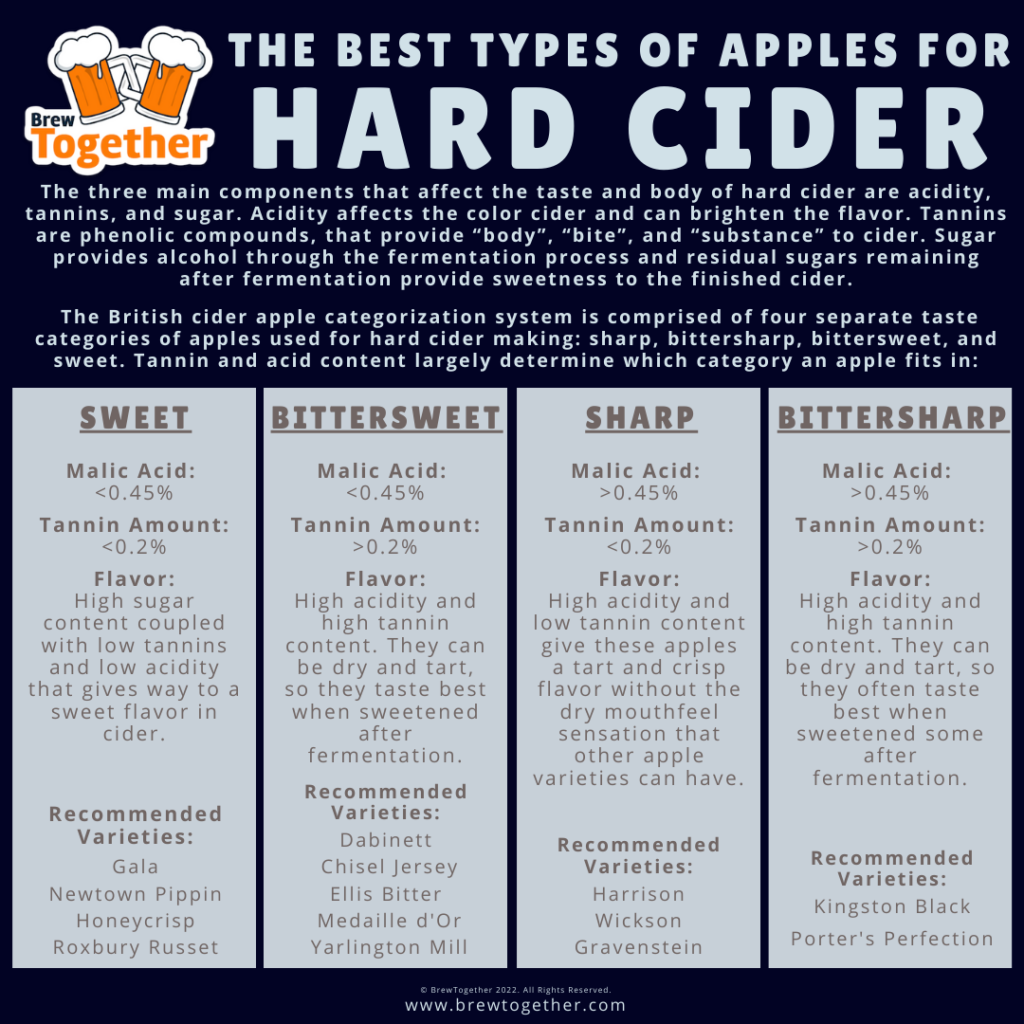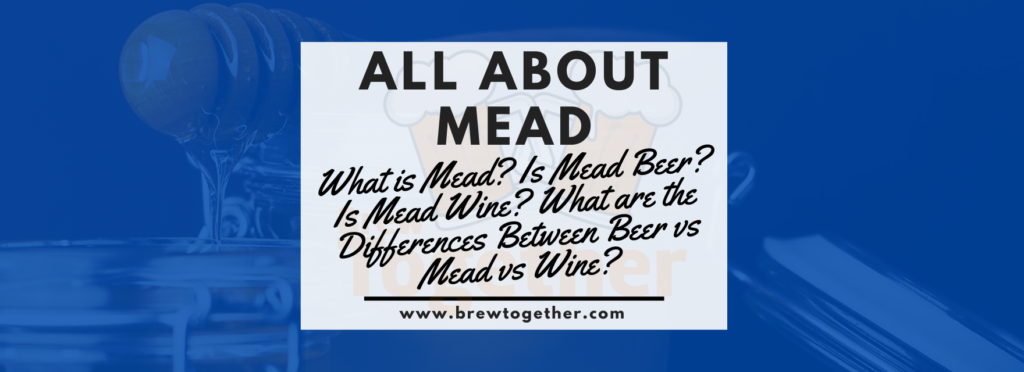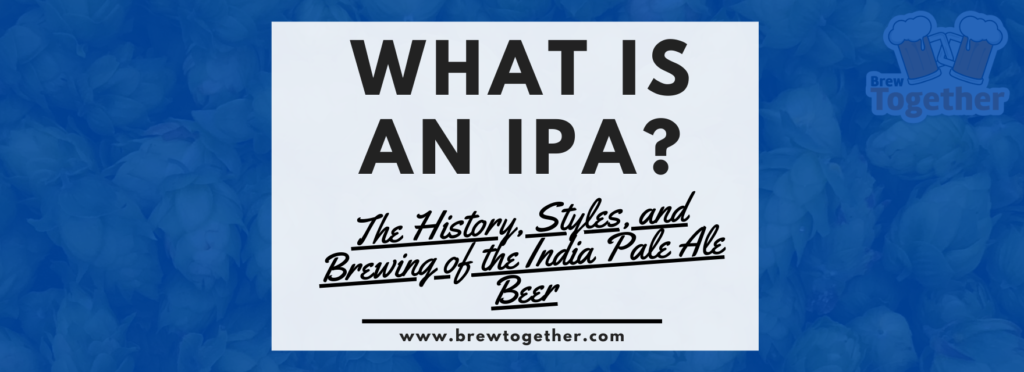The Best Varieties of Apples for Making Hard Apple Cider


Many different varieties of apples exist today, some with tastes perfected for making applesauce, putting into a homemade pie, or just taking a bite out of a fresh, juicy apple. With that in mind, there are also apple varieties ideal for brewing a hard cider. Just because an apple is great for pie or eating, such as common apples like granny smith and golden delicious, doesn’t mean they will make good cider. Some sweet apples make dry, unpleasant cider. Some sharp apples make great cider.
Finding the perfect cider apple can include a lot of trial and error, because the flavor of the apple juice is very different than the flavor of the fermented cider. Just as hop varieties and different grains can impact the flavors of your beer, and grape varietals can affect how your homemade wine tastes, the apples you choose to use affects how your hard cider tastes.
Not quite ready to make cider from fresh apples? Click here for step-by-step directions for how to homebrew hard cider from apple juice, which is perfect for beginners! Want to learn more about cider in general? Click here to read our Ultimate Guide to Cider!
Acidity, Tannins, and Sugar
There are three main components that are important to take into account when brewing a cider, as they can largely affect the taste of the hard cider you brew: acidity, tannins, and sugar.
Acidity has the ability to affect the color of your hard cider, as a high acid content prevents oxidation from occurring too quickly, thereby slowing the process of your apples browning. With this in mind, a higher acidity content in your apples should produce a lighter color for your hard cider. Acidity can also brighten the flavor of your cider.
Tannins are chemical substances, specifically phenolic compounds, that provide “body”, “bite”, and “substance” to the flavor of your hard cider. Both acidity and tannins play an important role in hard cider brewing, with the ability to curb the growth of bad bacteria that could cause your entire batch of hard cider to spoil.
Finally, sugar, of course, is very important to the process of hard cider brewing, not only because it is crucial to the fermentation process (yeast gets hungry, of course!), but also because residual sugars can impact the flavor of your homemade cider.
Cider Apple Categories
All three of the components described above (acidity, tannins, and sugar content – referred to as brix) come together in various quantities to provide for the British cider apple categorization system. This categorization system is comprised of four separate taste categories of apples used for hard cider making — sharp, bittersharp, bittersweet, and sweet. Tannin and acid content largely affect the placement of an apple into each category.


A French cider apple categorization system exists as well, in which sugar content, aka brix, is additionally taken into account. The French categorization system also has four categories, including sweet, bittersweet, bitter, and acidic.
Sweet Cider Apple Varieties
Gala
Galas are widely produced, and for good reason! This apple variety is mildly sweet, but still offers a crisp flavor lending itself well to a mellow hard cider. Due to their mild flavor, they can pair well with other more intense apple varieties.
Newtown Pippin
This dessert variety is not only tasty for eating (especially in applesauce!), but also adds a depth of flavor to a cider, making it quite popular for use in ciders. With its sweet-tart taste, and notes of spice and pine, this variety wonderfully mellows over time as it ages in a hard cider.
Honeycrisp
This cold-hardy variety is especially popular for eating in North America with their tart and crisp flavor. Though it can be used in ciders, it likely won’t add some of the flavor complexities you may be looking for when you brew your cider, as not all edible apples make the best addition to a hard cider.
Roxbury Russet
This variety is what is referred to as an “heirloom apple” and is the oldest American variety around today, dating back to before 1635. This apple variety has survived the test time of time due to its high sugar content and aromatic flavors that lend to a pleasant sweet cider.
Bittersweet Cider Apple Varieties
Dabinett
This French Bittersweet variety is known for its low acidity, medium sugar content, and high tannin levels. These qualities lend to a good astringency and well-balanced flavor when brewing a cider with this variety. Dabinett is actually considered to be one of the most versatile of the bittersweet varietals and in the past has been referred to as THE bittersweet to plant and use.
Chisel Jersey
This English Bittersweet variety is highly astringent, with high tannin levels and low acidity. As with all low acid juices of bittersweet varieties, it is recommended that this variety be combined with juice from other varieties with higher acidity to not only produce a more complete flavor, but also to inhibit bacterial growth.
Ellis Bitter
Similar to other bittersweet varieties, this English Bittersweet variety is recommended for combination with other varieties, especially those that are sweeter and will complement the bittersweet nature of the Ellis Bitter.
Medaille d’Or
This French Bittersweet variety is highly esteemed — so much so that its name literally translates to “gold medal” in french! Medaille d’or is high in tannins and considered to be a late-season variety, best combined with other late season varieties.
Yarlington Mill
This English Bittersweet variety is referred to by many as a “classic” when used for brewing cider. The Yarlington Mill, when all said and done, produces a smooth, pleasantly consumable cider. As with other bittersweet varieties, it can be blended with other varieties, however, it is among one of the few cider-making varieties that can be left standalone when brewing.
Sharp Cider Apple Varieties
Harrison
This American variety has been used in cider-making since the 1700’s! As a result, it is now viewed as a traditional, and even beloved, apple variety for use in cider. The Harrison variety is actually a variety of crab apples that, as with other sharp varieties, is high in acid, low in tannins, and can add a bite to the cider.
Wickson
This crab apple variety is also highly popular for cider brewing due to its high acidity, very high sugar content, and subsequent intense flavor.
Gravenstein
The high acidity of this cider apple variety contributes to a crisp tartness both when eaten, and of course, when brewed and drank as a cider as well! This aromatic variety can add depth and brightness to your cider.
Bittersharp Cider Apple Varieties
Kingston Black
This English Bittersharp variety is often considered to be the “perfect” cider apple! With its high tannin levels and high acidity, this variety is referred to as a “vintage quality” cider apple. This means that it does not need to be blended with other cider apples in order to produce a high quality cider. Though it can be difficult to grow, this variety is well worth it due to the full flavors that it can add to your cider. Kingston Black apples produce a cider that is smooth, dry, and even “slightly smoky and brandy-like”.
Porter’s Perfection
This English Bittersharp variety is also a favorite in the cider brewing world. Between the bright flavor produced by its medium acidity and the bite put forth by the high tannin levels in its juice, Porter’s perfection is a perfect variety (as the name says!) to blend together with other apples into a home cider!
Other Varieties
Now that you know the elements of cider and how they impact taste, see below for some of the most widely used apple varieties for brewing hard cider as well as how they can add to the flavor of your homemade hard cider! Do you have a favorite apple variety we didn’t list? Let us know in the comments below and we’ll add it to this list!
Some additional cider apple varieties that can be quite tasty when included in a homemade hard cider include:
- Rome Beauty
- Winesap
- Fuel Service
- Gnarled Chapman
- Harry Masters Jersey
- Chapman
- Northern Spy
- Ashmead’s Kernel
- Gold Rush
- Baldwin
- Frostbite
- Kermerien
- Bulmer’s Norman
- Reine de Pommes
Whether you make hard cider with apples you just have on hand or you thoroughly research what apple varieties to use, the most important part is to have fun with it! Whether you stick to this list, or throw in a few crabapples or wild apples, enjoy the process and the tasty end result – the crisp, refreshing taste of your homemade apple cider!
Thanks for Reading!
Still have questions about cider or anything else cider making and homebrewing related? Leave a comment below or post in the forums! The BrewTogether Community is made up of an awesome group of homebrewers around the world that are always happy to help!
Thank you for reading! If you like this article, please share it with your friends using the social media share buttons below! We need your help getting the word out about BrewTogether!
If you’re not a member of BrewTogether, we’d love for you to join! BrewTogether is completely free, and signing up is easy! Click here to join! We’d love to have you as a member of the BrewTogether Community!
Now using BrewTogether is easier than ever! Download the FREE BrewTogether Mobile App – available on both the Apple App Store and the Google Play Store! The BrewTogether App is completely free and drastically improves the experience of using BrewTogether on a mobile device.
Affiliate Disclosure: BrewTogether is a participant in the Amazon Services LLC Associates Program, an affiliate advertising program designed to provide a means for us to earn fees by linking to Amazon.com and affiliated sites. BrewTogether is also a participant in an affiliate program with MoreBeer, our favorite online homebrewing equipment/ingredients retailer. Some of the links in this article are affiliate links, which means that if you choose to make a purchase after clicking the link, I will earn a small commission at no additional cost to you. Please feel free to reach out with questions. Thank you!






Responses